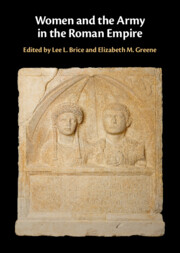Book contents
- Women and the Army in the Roman Empire
- Women and the Army in the Roman Empire
- Copyright page
- Dedication
- Contents
- Figures
- Maps
- Tables
- Contributors
- Acknowledgments
- Abbreviations
- Maps
- 1 Present but not Accounted For
- 2 Approaches to Women and the Roman Army
- 3 Agrippina and Company
- 4 Elite Marriage and Adultery in the Camp
- 5 Mother Courage and Her Children
- 6 Investigating Roles for Women inside Roman Military Bases through Artifact Distribution
- 7 (In)Visible Women and Children
- 8 Soldiers’ Wives en Route in Roman Egypt
- 9 The Role of Women in the Religious Activities of Roman Military Communities
- 10 Mater Castrorum
- 11 Women and the Military in the Age of Justinian
- Index
- References
4 - Elite Marriage and Adultery in the Camp
Pliny Epistles 6.31.4–6 and Tacitus Histories 1.48
Published online by Cambridge University Press: 24 October 2024
- Women and the Army in the Roman Empire
- Women and the Army in the Roman Empire
- Copyright page
- Dedication
- Contents
- Figures
- Maps
- Tables
- Contributors
- Acknowledgments
- Abbreviations
- Maps
- 1 Present but not Accounted For
- 2 Approaches to Women and the Roman Army
- 3 Agrippina and Company
- 4 Elite Marriage and Adultery in the Camp
- 5 Mother Courage and Her Children
- 6 Investigating Roles for Women inside Roman Military Bases through Artifact Distribution
- 7 (In)Visible Women and Children
- 8 Soldiers’ Wives en Route in Roman Egypt
- 9 The Role of Women in the Religious Activities of Roman Military Communities
- 10 Mater Castrorum
- 11 Women and the Military in the Age of Justinian
- Index
- References
Summary
This chapter examines how the episode in Pliny Ep. 6.31.4−6 relates to Roman concepts of gender and warfare. The emperor Trajan judged the case of Gallitta, a military tribune’s wife who had committed adultery with a centurion. Since the reign of Augustus adultery had been criminalized. The Augustan legislation on marriage and adultery has received much scholarly attention, but relatively little has been paid to cases involving military officers. This study argues that the repression of adultery and the control of officers’ wives culturally maintained military discipline, in particular the hierarchy of command. Adultery in this instance subverted military hierarchy; the young officer’s cuckolding of his senior and his failure to display self-control vitiated his fitness for command. The stability of the imperial order depended on the reinforcement of normative gender roles on the frontiers as well as in the city of Rome.
- Type
- Chapter
- Information
- Women and the Army in the Roman Empire , pp. 84 - 109Publisher: Cambridge University PressPrint publication year: 2024

